Afrobeat star arrested over 'police assault'published at 14:06 BST 15 May 2023
Videos posted online on Saturday showed the musician hitting a policeman in Lagos.
Read MoreThis is an automated feed overnight and at weekends
Videos posted online on Saturday showed the musician hitting a policeman in Lagos.
Read More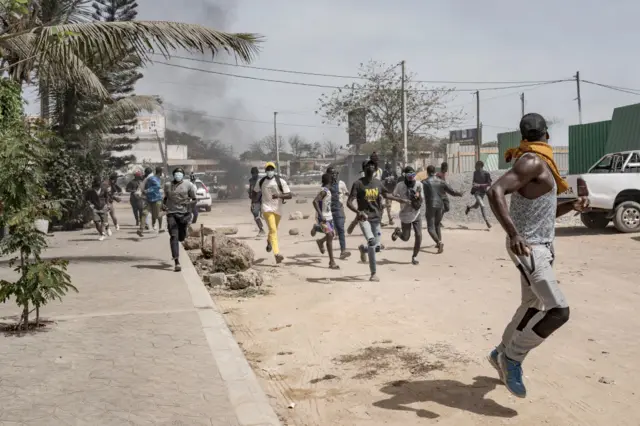 Image source, Getty Images
Image source, Getty ImagesMr Sonko was due to present himself to the criminal court on Monday (file photo)
Supporters of Senegal's opposition leader Ousmane Sonko have reportedly surrounded his home in the southern city of Ziguinchor to block his imminent arrest.
Mr Sonko was due to present himself to the criminal court on Monday ahead of his trial on Tuesday over alleged rape and death threats against a beauty salon employee in 2021.
Mr Sonko and his allies deny the charges and say they are a ploy to bar him from contesting the 2024 presidential election.
There have been intense battles as police attempt to disperse hundreds of opposition supporters in front of Mr Sonko's home, local media report.
Young people reportedly began assembling outside his home last week in “a patriotic vigil”, according to Press Afrik website.
Mr Sonko has said that he would defy court summonses in protest against the justice system.
He was handed a six-month suspended sentence on 8 May for defaming Tourism Minister Mame Mbaye Niang in a review of the initial two-month term.
Jelilat Olawale
BBC Yoruba, Lagos
Afrobeat singer Seun Kuti caused widespread outrage among Nigerians after a video surfaced, purportedly showing him slapping a police officer in the main city, Lagos.
It is not yet clear what led to the altercation, but the singer said in an Instagram post that the officer "tried to kill me and my family".
In a separate post, Kuti also stated: "I welcome the investigation and will give my full co-operation."
Police arrested Kuti after the police chief ordered an investigation.
Slapping a police officer is a serious offence in Nigeria, and if charged and found guilty, he risks three years in jail.
Nigerian Afrobeat singer Seun Kuti has been arrested for allegedly assaulting a police officer, Lagos police spokesman Benjamin Hundeyin has tweeted, external, along with a photo of the musician in handcuffs.
Kuti turned himself in at the headquarters of the Lagos State Police Command after police chief Usman Alkali Baba ordered his detention on Saturday.
He was "captured on video assaulting a police officer in uniform", the police spokesman added.
Kuti - the son of Afrobeat pioneer Fela Kuti - went to the police headquarters on Monday with his lawyer and family representative, Hundeyin added.
Before his arrest, Kuti said on Twitter that the policeman had tried to kill him and his family, but he did not explain how.
He and his lawyer have not commented since his arrest.
 The Newsroom
The Newsroom
BBC World Service
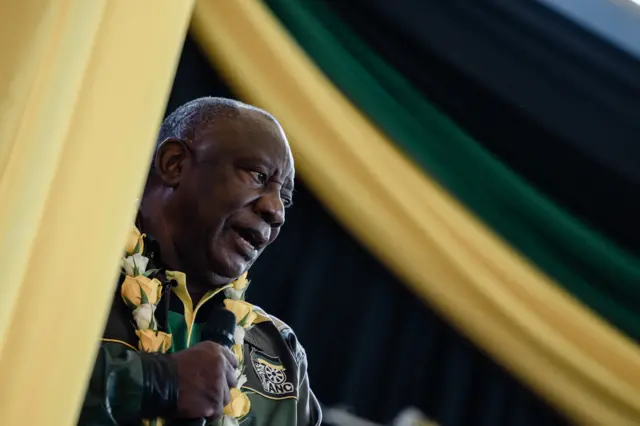 Image source, AFP
Image source, AFPPresident Cyril Ramaphosa says South Africa will not take sides
South Africa's President Cyril Ramaphosa has said there is "extraordinary pressure" on the country to abandon its non-aligned position on the war in Ukraine.
In in weekly newsletter, external, Mr Ramaphosa said South Africa would not take sides in what he said was "in effect a contest between Russia and the West".
His comments come days after the US ambassador to South Africa, Reuben Brigety, accused the country of secretly providing arms and ammunition to Russia, despite its professed neutrality.
Mr Brigety said US intelligence was confident they had been loaded onto a Russian ship at a naval base in Cape Town in December.
Mr Ramaphosa has agreed to investigate the claim but says there is no concrete evidence to support the allegations.
Kenyan President William Ruto says he appointed the head of the Kenya Defence Forces because he was the best, despite being among people who tried “to overturn my victory” in the last year’s general elections.
“I appointed General [Francis] Ogolla, he is among the people who went to Bomas to try and overturn my victory… But when I looked at his CV, he was the best person to be general,” he said.
“When I spoke to him, what exercised my mind, yes he may have made a mistake... When I talked to him, he told me ‘I have no defence…what I did was wrong’," Mr Ruto explained, saying he made the decision consciously and against the advice of many people.
The president was speaking during a televised interview on Sunday night.
He was responding to concerns that there was ethnic bias in appointments to government positions - which he denied.
During a petition against the presidential poll outcome, former chairman of Kenya’s electoral body Wafula Chebukati alleged that Gen Ogolla was part of a delegation from the National Security Advisory Council (NSAC) that sought to influence the election results to favour opposition leader Raila Odinga.
In a sworn statement to the Supreme Court, he said that Gen Ogolla and others in the NSAC had been sent to the tallying centre in the capital Nairobi.
NSAC denied the allegations but acknowledged holding a meeting with the electoral body chairman.
The Supreme Court, which upheld Mr Ruto’s victory, did not make any definitive finding about the Mr Chebukati’s allegations.
 BBC Monitoring
BBC Monitoring
The world through its media
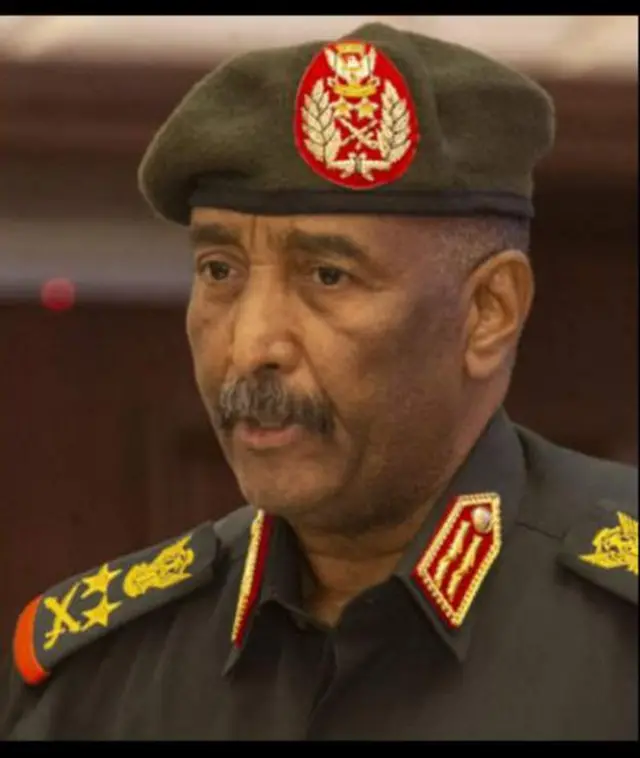 Image source, Getty Images
Image source, Getty ImagesGen Burhan also retired four military officers linked to the paramilitary group
Sudan’s army chief Gen Abdel Fattah al-Burhan has issued a directive to freeze the bank accounts of the paramilitary Rapid Support Forces (RSF) group and its affiliated companies.
In a number of decrees on Sunday, Gen Burhan also retired four military officers linked to the group.
One of the affected officers is Brig Gen Omar Hamdan Ahmed, a relative of RSF commander Gen Mohammed Hamdan Dagalo, and who is currently heading a delegation of the paramilitary force for peace talks with Sudan’s army’s in Jeddah, Saudi Arabia.
Gen Burhan also sacked central bank governor Hussain Yahia Jankol and appointed Borai El Siddiq in his place.
He did not provide a reason for Mr Jankol's sacking.
Meanwhile, state-run channel Sudan TV resumed its satellite broadcasts on Sunday, a week after going off air.
The station’s transmission has been cut several times since the fighting between the army and the RSF began on 15 April.
It continues to give prominence to the army’s claims against the RSF.
 Thomas Naadi
Thomas Naadi
BBC News, Accra
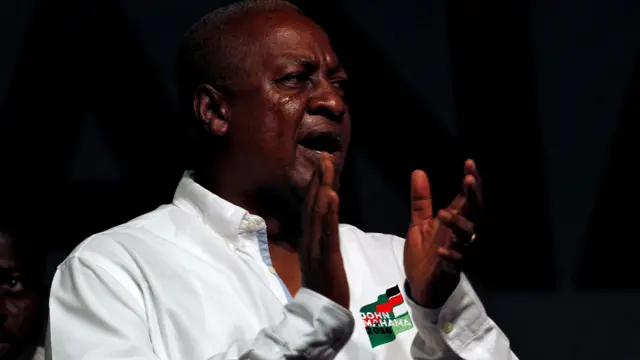 Image source, Reuters
Image source, ReutersThis will be the third time the former president will be attempting a comeback
Former President John Mahama has been elected flag bearer of the largest opposition party in Ghana, the National Democratic Congress, ahead of elections next year.
The former president was declared the winner on Sunday after securing 98.9% of total valid votes in the party’s primaries held on Saturday.
His landslide victory was against his main contender, the former mayor of Kumasi Kojo Bonsu.
A third candidate Dr Kwabena Dufour had pulled out of the race after alleging discrepancies in the electoral roll.
In a Facebook post after his victory, Mr Mahama called for unity in the party.
This will be the third time the former president will be attempting a comeback after losing power in the 2016 elections to incumbent President Nana Akufo-Addo, who is ending his two-term mandate next year.
Former President Mahama is an experienced politician, haven served as vice-president and then president after the demise of late president John Evans Atta Mills in office.
He went ahead to win the 2012 elections and served for a one-term period of four years.
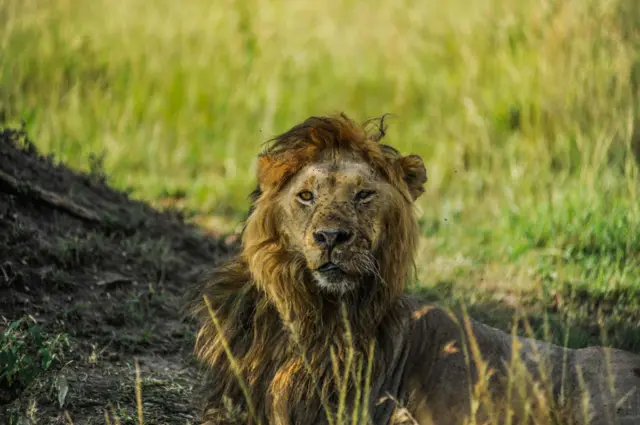 Image source, Getty Images
Image source, Getty ImagesNearly a dozen lions were killed after attacking livestock in south-western Kenya
Kenyan government officials have visited herder communities in the south-west after nearly a dozen lions were recently killed after attacking livestock.
The officials, including the tourism minister and Kenya Wildlife Service officials, met residents of the Mbirikani ranch amid escalating human-wildlife conflicts that led to the killing of 11 lions by herders living near the Amboseli National Park.
The minister, Peninah Malonza, said the government was working to ensure pending claims by the community seeking compensation for wildlife attacks were settled.
She urged the local people to embrace a “peaceful and harmonious co-existence with wildlife” even as their concerns were being addressed.
The killing of the lions, including one of the country’s oldest lions, has been seen as a blow to conservation efforts and the tourism industry – which is a major contributor to Kenya’s economy.
Communities living near game parks and nature reserves in Kenya have often complained that lions and other carnivores kill livestock and domestic animals, with little or no action by government, including on compensation.
 Will Ross
Will Ross
Africa editor, BBC World Service
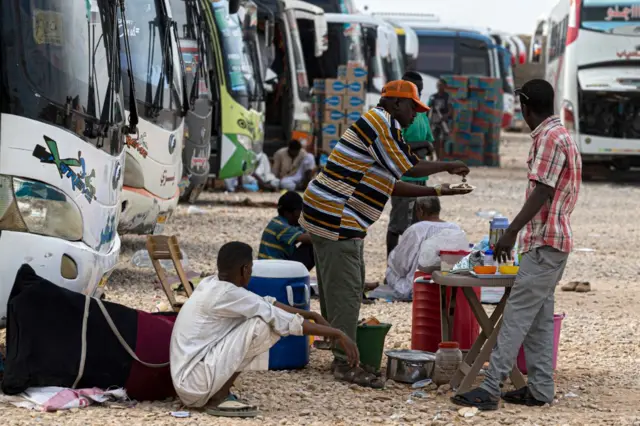 Image source, AFP
Image source, AFPMost of the people are displaced within the country
The UN says the month-long war in Sudan has now forced close to a million people to flee their homes - most of them are displaced within the country.
Despite an agreement to protect civilians, both the army and the rival Rapid Support Forces have continued to fight in densely populated areas - especially in Khartoum.
Both the Sudanese army and the rival Rapid Support Forces or RSF are blaming each other for shots fired at a church on the outskirts of Khartoum that left a number of people injured.
Envoys of both sides are meant to be meeting in Jeddah to plan the withdrawal of the fighting forces from populated areas.
But that seems highly unlikely to happen given that the RSF is deeply entrenched in neighbourhoods across the capital.
The insecurity in Darfur is getting worse. In El Geneina Arab militias allied to the RSF have been attacking homes.
No-one seems to know how to stop the war in Sudan and there's a real danger it could destabilise the entire region.
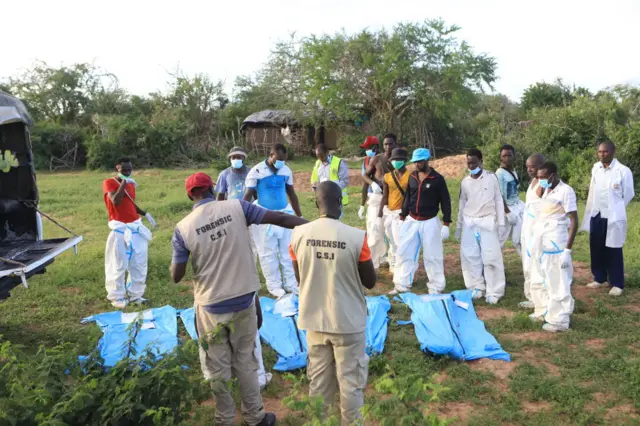 Image source, Getty Image
Image source, Getty ImageMore than 200 bodies have so far been exhumed in the coastal Shakahola forest
President William Ruto has apologised to Kenyans over the Christian doomsday deaths, admitting laxity and complacency from the government side.
More than 200 bodies have so far been exhumed in the coastal Shakahola forest, where congregants were allegedly forced to starve to death in order to meet Jesus. More than 600 people are still missing.
"I am taking responsibility that, as the president, these (Shakahola murders) should not have happened. For that, I truly say, I'm sorry," Mr Ruto said in a televised interview with Kenyan media houses on Sunday.
He blamed the country's police and intelligence officials for failing to discover the cult’s activities on time.
He said the concerned officials would have to give an account of the mass killings.
The president said that he would do everything in his power to prevent future religious deaths.
He also promised to visit the Shakahola forest once investigations were completed.
Read more here
 BBC Monitoring
BBC Monitoring
The world through its media
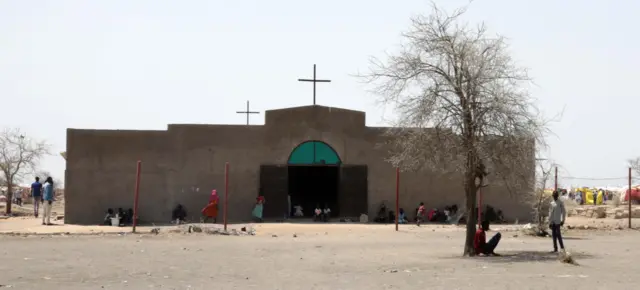 Image source, Reuters
Image source, ReutersViolence continues in the country despite a deal signed in Saudi Arabia last week (file photo)
The Sudan Armed Forces (SAF) have accused the paramilitary Rapid Support Forces (RSF) of attacking worshippers in a church in Omdurman, a city adjacent to the capital Khartoum.
The army in a statement, external on Sunday claimed RSF shot at worshippers in the Blessed Church in Omdurman against international humanitarian law and established customs.
But in a Twitter post, RSF denied that it had attacked the church and instead accused an "extremist group" aligned with the SAF of being behind the attack.
The force also accused SAF of "assassinating” an official of a football federation, Amir Hasaballah, and other killings in the capital.
Earlier, SAF had accused RSF of attacking two hospitals in Khartoum and urged the international community to recognise the group as a "terrorist organisation".
Violence continues in the country despite a deal signed in Saudi Arabia last week, which requires the warring sides to facilitate humanitarian aid and to protect civilians.
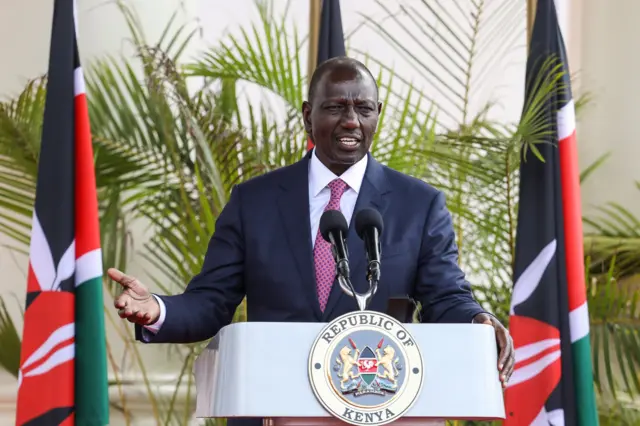 Image source, Reuters
Image source, ReutersMr Ruto said he decided to cut down after the elections in efforts to keep healthy
Kenyan President William Ruto says his visible weight loss is his deliberate effort to keep fit amid concerns by some Kenyans on social media over his health.
Speaking during a televised media interview on Sunday, President Ruto explained he had added some weight during the campaign period in 2022.
During that time, he said, there was a lot of pressure that sometimes led to stress eating.
Mr Ruto said he shed some weight after resuming his fitness, dieting and wellness programme.
"With the nature of my job, I have to be alert," said Mr Ruto.
A section of Kenyans had observed that President Ruto had lost weight months after taking over from his predecessor.
Others speculated that the head of state may have been unwell.
Our proverb of the day:
Quote MessageOnly the fat cattle lick each other."
A Shona proverb sent by Francis Muzofa in Harare, Zimbabwe
Jerry Brotton listens for the voices and tells the stories of the ‘other Tudors’: ten men and women from across the world that lived, worked, worshipped and died in Tudor England.
The popular fascination with the Tudors tends to concentrate on the lives of white, elite, English-born men (and the occasional woman). But Tudor England also saw Muslims, Jews, Africans and Native Americans come and go from the Russia, Persia, Morocco, Italy, Spain, Portugal and the Americas, making their homes and careers here, and in the process transforming the nature of early English culture and society. This series tells the stories of ten individuals that reveal a very different story of the Tudor period as a time of multicultural exchange, encounter and ordinary working people living alongside each other.
9. Mohammed al-Annuri
Presenter Jerry Brotton is Professor of Renaissance Studies at Queen Mary, University of London.
Producer Mark Rickards
A Whistledown Scotland production
David Aaronovitch and guests discuss the latest events in Sudan. Fighting has been commonplace ever since Sudan gained independence but what's behind the latest violence?
Guests:
James Copnall - currently presenting Newsday on the BBC World Service and formerly the BBC's Sudan correspondent
Mohanad Hashim - Sudanese journalist working on Newshour on the BBC World Service
Dame Rosalind Marsden, associate fellow at the Chatham House International Affairs and former UK ambassador to Sudan
Professor Alex De Waal, Executive Director of the World Peace Foundation and Research Programme Director with the Conflict Research Programme at LSE
Produced by: Kirsteen Knight, Claire Bowes and Ben Carter Edited by: Penny Murphy Sound engineer: Rod Farquhar Production co-ordinator: Siobhan Reed and Sophie Hill
Journalist Jonathan Guyer examines the different forms of noir fiction addressing the failed revolutions, jihadism, and chaos in Egypt.
Away from caliphate building and sectarianism, a neo-noir revolution has been creeping across the Middle East, allowing artists and writers to act as ombudsmen in the current political climate. Jonathan meets the writers who are latching onto the adventure, despair and paranoia prevalent in genre fiction to tell stories that transcend the present. He looks at Ahmed Mourad's novel, Vertigo, and Magdy El-Shafee's graphic novel, Metro, which Egyptian authorities seized all copies of before release.
Drawing parallels with the golden age of noir in America, Jonathan argues that, while the Middle East offers an ethereal backdrop like that of post-war America, the Middle East's neo-noir revolution is anything but nostalgic, giving authors and scholars an opportunity to critique imported wars, local autocrats and arrested revolutions.
What's surprising, he finds, is not that detective fiction is showing a sudden popularity in Cairo and beyond but that the genre has been relatively dormant for the last several decades. Sorting through the discarded vintage dime novels in creaky Cairo bookstalls, he discovers that detective fiction has had a long relationship with Arab readers.
Presented by Jonathan Guyer Produced by Sean Glynn and David Waters An SPG production for BBC Radio 4.